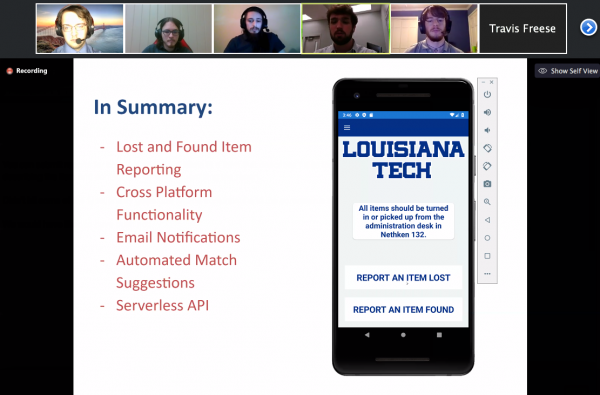Louisiana Tech holds virtual Senior Projects Conference

Leader photo by CALEB DANIEL
This screenshot was taken during one of the many Louisiana Tech College of Engineering and Science senior project presentations conducted over Zoom Friday. Computer science students at the top of the screen presented their LATech Lost & Found app to faculty and spectators via videoconference.
Seniors in Louisiana Tech University’s College of Engineering and Science (COES) were originally going to culminate their final year by presenting their capstone projects inside Tech’s new Integrated Engineering and Science Building. But the outbreak of the novel coronavirus in mid-March forced other plans.
Like all of Tech’s classes, the Senior Projects Conference went virtual this year, conducting more than 100 presentations in roughly 20 “rooms” on the video conferencing app Zoom Friday.
Senior capstones are usually yearlong projects seeking to address real-world problems with new products, often sponsored by the university’s industrial partners. Each year, seniors from all 14 COES majors present their research to faculty, fellow students and business representatives.
“We view this as a critical part of the experience for our students,” said Heath Tims, associate dean of undergraduate studies for the COES. “Not only is it a big part of their curriculum, but it is an experience that the students really want to have. They have worked so hard, and they want to show what they have done to others.”
If the college had been able to hold the conference in the new engineering building, it would have been the first time all the teams could have presented under one roof. Instead, the coronavirus separated the students under more roofs than ever before
“When the COVID-19 situation occurred, we had to adjust our thinking,” Tims said. “Zoom is something that we have been using this term for classes, so we felt that it would be easier for everyone to adapt to.”
The college’s different disciplines were split into separate Zoom calls, with faculty members volunteering to serve as moderators and control who could share their screens with audience members and who could speak.
“One positive is that we were able to have viewers from all across the country who would normally not be able to attend,” Tims said.
Prototypes developed by student teams this year ranged from contraptions like the Contingency Cut-off Tool, a hydraulic saw designed to assist with oil and natural gas extraction on the seafloor, to software like LATech Lost & Found, an app for Tech students to report and turn in
Luke Moreau, part of the Contingency Cut-off Tool team in mechanical engineering, said the transition to virtual communication introduced many challenges to his group.
“Our prototype was heavy and not easily transported, so we had to figure out a way to get it in the hands of one of our team members to make sure we could still work on it,” he said.
“However, the biggest challenge we faced was not being able to do more testing over the course of the spring quarter. We had to take the data we got from the winter quarter and come up with an estimate of what our results were.”
The project was sponsored by OneSubsea, a Schlumberger company, headquartered in Houston. Moreau said his team was already communicating with their sponsor remotely, so the virus closures didn’t change that, but the team had to cancel a trip to Houston to see the machines for which they were building an attachment, which he said was “a bummer.”
Despite the extra challenges, he said both the final product and Friday’s presentation came out well.
“We were able to get the main components of the tool designed, built, and tested,” Moreau said. “The team presented very well, and we got our point across clearly. (OneSubsea) will be able to take ideas from our design and redesign a tool for their use.”
Christopher Damare with the LATech Lost & Found team said he counts his group “lucky” to have been involved with a softwareonly project once things went virtual due to the virus.
“The group was very pleased with the final project we ended up with,” he said. “We were able to implement the core functionality of the app… There were some extra features that if we had more time we would have liked to have implemented, but overall, we were still very pleased with what we managed to accomplish within the time frame we were given.”
Hisham Hegab, dean of Tech’s COES, said despite the separation and new format, students rose to the challenge and, he hopes, learned some new skills along the way.
“I think they did great,” he said. “It’s definitely a challenge for them to finish off the year without being able to meet in person. But I think it was a good experience for them. The working world they’re going into has a lot of (remote communication) in it now, so this is a good preparation for it.”

